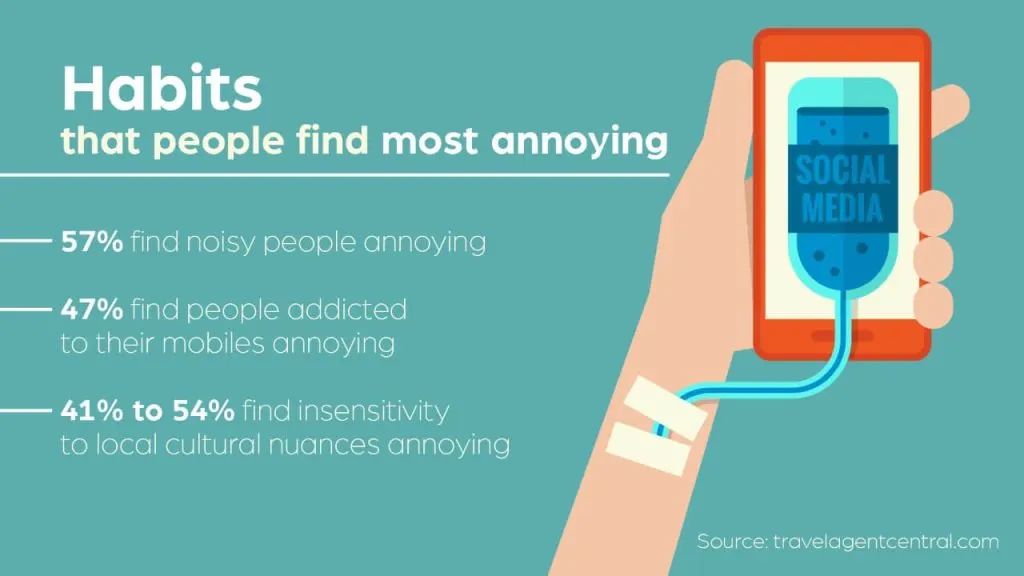How often have you heard that you need to love yourself for others to love you?
It sounds so simple to just love yourself.
But nothing is harder than loving and accepting a person for what they truly are, even when that person is yourself.
For certain types of people, that is even mission impossible.
The fact is the way we feel largely determines how others will experience us.
When you are anxious and annoyed by anything in your life, chances are others will also find you annoying.

But what if you are actually the only person who finds you annoying?
The good news is that most people who worry about being annoying are the least annoying, while those who annoy us the most never question their behavior.
Why do we sometimes lack the love for ourselves that we so easily give to others?
Why do we feel like we annoy everyone around us?
How come some people communicate so effortlessly and seem so worry-free?
If these questions often run through your mind, stay tuned, as we will provide you with the answers you were looking for.
In this article, you’re going to find out more about:
- Growing Up Too Soon
- Not Feeling Welcome in Your Own Family
- How You Learn to Feel Like You Are Annoying
- What If You Realy Are Annoying
You Had to Grow Up Too Soon
Family life in the last couple of centuries has changed significantly – people spend most of their time at work, leaving them little time for their loved ones.
Women are still often faced with a choice between a child and a career.
But many don’t even have a real choice.
They have to work to provide for the family just like men do.
Overall, modern western society doesn’t seem to be a huge fan of family life, at least not for real.
Absent parents who work too much and are exhausted when they are finally at home with kids often find their children too emotionally demanding.

They lack the patience to sit and play, to be children with their children, and they encourage their children to grow up and act mature even though they are not nearly ready for that kind of behavior.
These parents don’t smile and seem happy when they see their kids; they are just another item on their long list of responsibilities.
And that’s exactly how their children feel about themselves, though they often do not have words to say so.
They feel like they are “too much” for their tired, stressed parents.
To keep their love, children try hard to be adult-like, take care of themselves, and not ask for too much.
They often succeed and become self-sufficient at a very early age.
But this comes at a very high price – these people live with a strong belief that if they ever show what they really need, others will find them annoying, burdening, childish and what have you.
Because their parents couldn’t handle them as kids with all their normal childish whims, these people live with a chronic feeling that they are annoying, especially when they allow themselves to relax.
Maybe Some Family Members Were Not Happy To Have You
Sometimes, it’s not all about the parents.
An older brother or sister who wasn’t happy to have a younger sibling may constantly send both verbal and nonverbal messages that you are not welcome.
Parents may not take an older child who doesn’t accept his younger brother or sister seriously, so the younger one is often left alone with the feeling that he/she is not wanted in the family.
If any of the descriptions resonates with you but don’t feel comfortable blaming your parents or your brothers/sisters, you need to know that it doesn’t matter who is to blame.
Understanding how this feeling of being annoying was imprinted in your soul before you even had the chance to fully apprehend what was going on does matter.
You Can Only Learn to Feel Like You Are Annoying
No baby is born into this world feeling like they annoy anyone.
All babies scream restlessly whenever any of their needs is not met.
It took the repeated experience of being rejected to make you feel like you are annoying.
It took many years of being treated like a burden to get to feel like a burden.
And, if you are honest with yourself, you’ll easily come to understand that this feeling of being annoying is not new, is it?
Instead of sharing quick tips and popular new-age techniques for resolving your inner struggles, what we offer here is understanding.
Before love and acceptance come understanding.
Only when you understand what happened to you can you be able to grasp who you actually are and love yourself.
So, the next time you feel like you annoy everyone, stay with your feeling.
Try to remember when you felt like you annoy everyone as a child.
Check whether you are really reacting to something happening here and now or you are actually repeating your childhood experience.
Ask yourself:
- What clues do I get from people that make me feel like I am annoying?
- Are those clues obvious to everyone, or am I the only one who notices them?
- Wouldn’t these people tell me openly if they find me annoying?
- Could I ask them directly if they find me annoying?
- What would I think and feel if they told me directly I was annoying?
- What would I think and feel if they told me I wasn’t annoying at all?
It is also a good idea to write down answers to these questions, and then when you feel more at ease, read them and analyze them to understand yourself better.
Maybe You Realy Are Annoying
In certain situations, people may act in such a way as to make you feel undesired on purpose.
This may happen at work if you are new to the team or come as a replacement for some beloved coworker.
It is also a common scenario at schools and all kinds of social gatherings.
Suppose you already have an experience being rejected in your own family.
In that case, any new situation in which you are not welcome may easily trigger the feeling of being annoying and unwanted.
And sometimes, in some settings, the way you normally behave may really be annoying due to cultural differences.
If, for example, in your culture, it is common to kiss people twice on the cheeks when you greet them – this habit may be considered annoying or even weird in some other cultures where greetings are done differently.
So, what can you do?
First of all, try not to jump to conclusions of any kind until you are sure you know the background of any situation.
If you instantly react to your own fear of being annoying to others, people may not find you annoying but will see that you are wearing a chip on your shoulder.
Second, you can never be sure unless you ask.
So instead of constantly ruminating about whether you are annoying or not, ask the people around you kindly and directly if they find your behavior annoying in any way.

In Conclusion
There is a huge difference between feeling like you are annoying everyone and annoying everyone.
If you really are annoying, people will surely, at some point, and in some socially acceptable manner, show you that you annoy them.
They may try to avoid you or simply be rude to you.
But, if the real signs of you being annoying to others are missing and all you have are your presumptions, you are probably under the influence of your past experiences with significant others who made you feel unwanted.
In that case, it would be wise to take some time to understand your experience.
Until you understand what happened to you and why you often feel like you are annoying others, you’ll carry that feeling with you in all situations.
It will cloud your judgment and prevent you from forming real, meaningful relationships with others.
The good news is once you recognize what causes this feeling in you, you’ll be able to overcome it quickly and easily, and you’ll also get a more profound understanding of others’ feelings.
